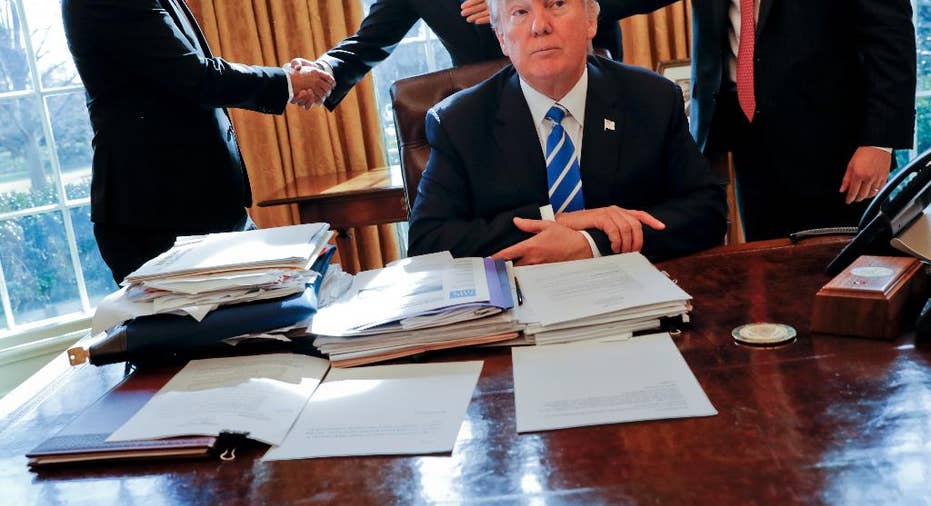Carbon tax push from former GOP officials faces uphill slog

WASHINGTON – A push by a group of senior Republican statesmen for a tax on carbon to help combat the effects of climate change is already meeting entrenched opposition from within their own party.
Former Secretary of State Jim Baker went to the White House on Wednesday to gain Trump administration support for the plan, which would place a new tax on oil, natural gas and coal and then use the proceeds to pay quarterly dividends to American taxpayers. They said the payments would amount to about $2,000 total each year for families.
In addition to Baker, former Secretary of State George Shultz and other former officials from the Reagan and Bush administrations support the proposal. Republicans, the group argued, need to take a leadership role on fighting climate change, a problem for which they said the evidence is growing too compelling to ignore.
A delegation led by Baker met Wednesday with White House Chief of Staff Reince Priebus and Gary Cohn, director of the National Economic Council. Vice President Mike Pence, Trump son-in-law and senior adviser Jared Kushner and Ivanka Trump were also invited by organizers, though it was not immediately clear whether they attended.
Asked about the meeting at his daily briefing, White House Press Secretary Sean Spicer declined to comment.
Speaking to reporters prior to the meeting, Baker conceded that his group faced an uphill slog. Within hours of their announcement, influential conservative anti-tax crusader Grover Norquist took to Twitter to suggest the proposal was dead on arrival.
"Now that the GOP can repeal all the anti-energy, anti-job regs--the Left offers to trade those regs for a carbon tax," tweeted Norquist, president of the group Americans for Tax Reform. "Nice try. No."
Congressional Republicans have repeatedly beaten back proposals for instituting a carbon tax, which would raise the cost of fossil fuels to discourage consumption. In June, the GOP-lead House voted overwhelmingly in support of a resolution opposing carbon taxes, which Republican leaders have said would be "detrimental to the United States economy" and lead to skyrocketing costs for food, gasoline and heating oil.
Senate Leader Mitch McConnell's office declined to comment. The office of House Speaker Paul Ryan did not immediately respond to a request for comment.
Baker and Shultz are pinning their hopes on the political appeal to conservatives of sending out regular dividend checks to taxpayers.
According to an outline of the plan, the group is calling for a gradually increasing carbon tax that "might begin at $40 a ton and increase steadily over time." They estimate it would raise $200 billion to $300 billion annually, which would be redistributed back to taxpayers.
With the "carbon dividends" potentially reaching about $2,000 annually for a family of four, the group estimates that about two-thirds of Americans would receive more money back than they would pay in increased fuel costs. That would provide an economic incentive to embrace more fuel efficient cars and greener sources of electricity.
As part of the proposal, the group also recommends repealing nearly all carbon emissions regulations approved under President Barack Obama, including the Clean Power Plan.
So far, Trump has sent mixed signals on whether or how he will try to slow Earth's warming temperatures and rising sea levels. He has called global warming a "hoax," but also recently met with prominent climate activists Al Gore and Leonardo DiCaprio.
Ivanka Trump, a close adviser to her father, has indicated interest in working on the issue. But the president has also hired oil industry champions who want to reverse Obama's efforts to rein in emissions.
The majority of peer-reviewed studies and climate scientists agree the planet is warming, mostly due to man-made sources. Under Obama, the U.S. has dramatically ramped up production of renewable energy from sources like solar, in part through Energy Department grants.
Some environmental activists support a tax on emissions to help transition off fossil fuels. Sen. Bernie Sanders advocated for a carbon tax as part of his bid for the Democratic nomination last year. Hillary Clinton, the Democratic nominee, never supported a tax, though she offered a slew of proposals to deal with climate change.
Trump's secretary of State, Rex Tillerson, was the longtime chief executive officer of Exxon Mobil. Exxon was long considered a leading opponent of efforts to reduce greenhouse gas emissions from burning fossil fuels. But under Tillerson's leadership, Exxon has started planning for climate change and even voiced support for a carbon tax.
Trump's choice to run the Environmental Protection Agency is Oklahoma Attorney General Scott Pruitt, who has expressed doubt about the level to which human activity is responsible for climate change. Trump's nominee to run the Energy Department, former Gov. Rick Perry, has also questioned the validity of climate science even as his home state of Texas has become a leading producer of wind energy.
___
Associated Press White House correspondent Julie Pace contributed.
___
Follow Biesecker at Twitter.com/mbieseck



















